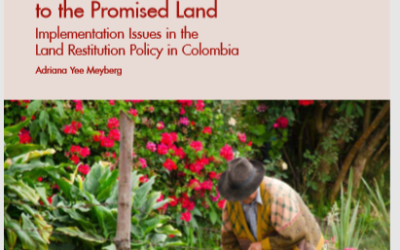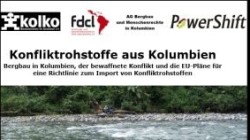Aus Sorge um die Zukunft der Waffenruhe aufgrund von erhöhter militärischer Aktivität am Boden sowie starker paramilitärischer Präsenz haben 130 Organisationen und Personen der Zivilgesellschaft einen Brief an die Verhandlungsdelegationen der kolumbianischen Regierung, der FARC sowie des ELN gerichtet.
Bogotá, 19-11- 2015 Juan Manuel Santos President of Colombia
Humberto de la Calle Lombana
Lead Colombian Government Negotiator
Sergio Jaramillo
High Commissioner for Peace
Rodrigo Londoño Echeverri FARC-EP Commander
Luciano Marín Arango Lead FARC-EP Negotiator
Nicolás Rodríguez Bautista ELN Commander
Greetings,
The civil society organizations ascribed to this letter, some of whom have supported a negotiated solution to the armed conflict for more than 30 years, were informed of the “advances that have been made possible over the past few months due to the FARC-EP’s compliance with the unilateral ceasefire and the Colombian military’s suspension of bombings” by the Social Ceasefire Monitoring Group through their November 8 publication.1 These steps have undoubtedly positively impacted the lives of Colombians.
Despite this positive assessment, we have also been informed by the organizations that make up the Social Ceasefire Monitoring Group2, other Colombian civil society organizations and our partner organizations on the ground of circumstances that may put these achievements at risk, such as:
1. The persistence of Colombian Military offensives against the FARC-EP guerrilla such as that which occurred in Cartagena de Chairá in October of this year. We believe that this type of offensive does not match what was announced by the two sides in Communiqué # 5 published July 12, 2015 which refers to “speeding up in Havana and de-escalating in
Colombia,”3 which sought mainly to protect civilians and, to the contrary, puts the unilateral ceasefire and a possible bilateral ceasefire at risk.
2. The increase in paramilitary structures in numerous places around the country constitute a risk for civilians and their political participation as well as a risk for the peace process and the viability of the implementation of accords that could be reached between the Colombian government and the FARC-EP guerrilla. As mentioned in the Social Ceasefire Monitoring Group’s seventh report these structures have been seen witnessed in areas of strong Colombian military presence or operational capacity such as Bajo Atrato, Chocó; San José de Apartadó, Antioquia; Mapiripán, Meta; Villanueva, Tauramena and Monterrey, Casanare; El Zulia, Norte de Santander; Buenaventura and Tuluá, Valle del Cauca; Corinto, Caloto, Santander de Quilichao, Buenos Aires and Suárez, Cauca; Tumaco, Nariño; and Puerto Libertador, Córdoba.
Given this, we call for you:
1. To implement further measures to de-escalate the armed conflict and to continue to progress on the technical and political aspects necessary for a bilateral ceasefire and final bilateral cessation of hostilities which we have called for since the beginning of the formal dialogs. Until then we remind you of the obligation of all parties in internal armed conflicts to respect the principles and rules established in International Humanitarian Law4 such as the principle of distinction and the use of force within the limits of humanitarian protection, seeking to minimize the impact of the conflict on the civilian population.
2. To quickly move forward on concrete proposals to clarify the paramilitary phenomenon in accordance with point 3, numeral 7 of the General Agreement for the Ending of the Conflict.
3. To quickly move forward on finalizing and publishing the agreement on the Holistic System of Truth, Justice and Reparations which has been discussed at length seeking to maximize victims’ rights. This will enable victims to participate in the justice mechanisms and prepare their cases to claim their rights.
4. To quickly move forward on finalizing a Conversation Table with the ELN that might lead to the beginning of formal dialogs, de-escalation and a possible ceasefire.
We once again declare our commitment to a negotiated, political solution to this conflict.
Signed,
(für die Unterschriften konsultieren Sie bitte die spanische Fassung im pdf)
Spanische Fassung des Briefes als download:


